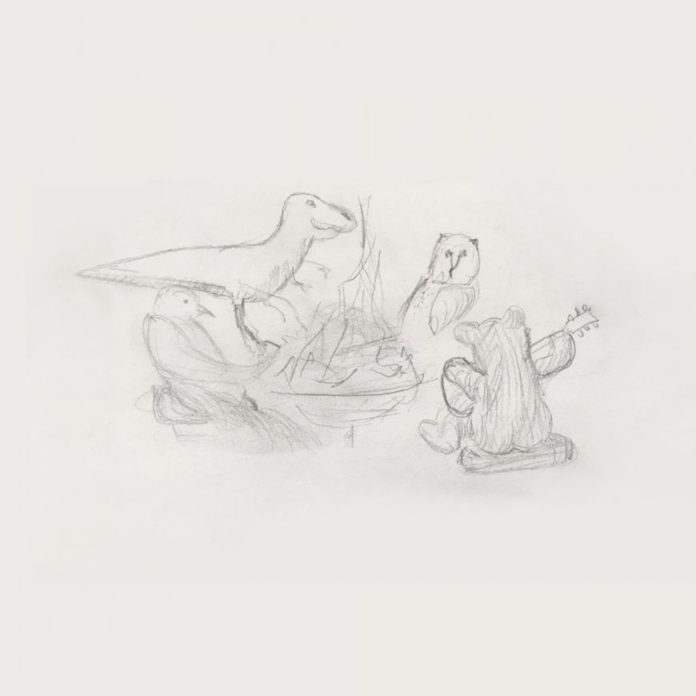
Big Thief’s genre-sprawling, 20-song masterpiece Dragon New Warm Mountain I Believe in You, opens with the four-chord country ballad, “Change,” which captures the untamed electricity of a first take, as well as the nervousness, tension and purity in a never-before performed song: the first full-band practice ever was captured in secret by Dom Monks, the session’s producer.
James Krivchenia, the band’s drummer and–for Dragon–its executive producer as well, timidly strikes the bass drum on the first beat of every measure, softly pushing the song forward into the next verse, where a resonant bass line creeps into the mix. With a simplistic drum fill, the song bursts like a distant star on a cloudless night into the chorus, as guitarist Buck Meek lends his harmonies along with a messy guitar melody. Big Thief, in a surprise take before a take, is acting its best as a band, a union of musicians uplifting the brilliance of its central songwriter, Adrianne Lenker.
The album was recorded over the span of five months in four different locations. Big Thief traveled the American countryside and stopped in Upstate New York, Topanga Canyon, the Rocky Mountains, and Tucson, Arizona, to work with different producers, sounds and spurs of inspiration. The result was 45 songs chopped down to a double album, an abstract amalgamation of genres. The record ranges from melancholic acoustic ballads to eerie trip-hop to lo-fi pop anthems, as Lenker flaunts her skills and talents as a songwriter through the album’s diverse tracklisting.
“Time Escaping” is driven by the metallic sound of slapping handpans; it’s danceable, energetic and unpredictable. “Wake Me Up to Drive” is a fun road-trip anthem with a quaint arrangement of Casio drums, chord organs and lazy vocals, sounding like an homage to the Magnetic Fields’ lo-fi jangle pop. “Promise is a Pendulum” features just Lenker and her guitar, which she plucks at with fluctuating tempos and a few botched notes. The purposeful disregard for traditional standards of perfection and the intimacy of the recording is reminiscent of her 2020 solo album songs, which she recorded at the beginning of the coronavirus pandemic while isolated in a cabin.
Dragon is all about community, connecting with others through music through love and through imperfection. Lenker shines with a smirk on “Spud Infinity,” where she employs a comedic lyrical style foreign to Big Thief’s previous albums, which tend to be emotional and somber. Now, Lenker opts to jest about humans’ insignificance with an observational wit parallel to Bob Dylan or David Berman.
“When I say infinity I mean now / Kiss the one you are right now / Kiss your body up and down, other than your elbows / ‘Cause as for your elbows, they’re on their own / Wandering like a rolling stone / Rubbing up against the edges of experience,” Lenker sings with a playful self-awareness. You can hear the slight smile on her face as she acknowledges her own pun.
The song sounds like a communal, campfire sing-a-long, evoking an image similar to the album’s sketched cover. Lenker’s brother, Noah Lenker, plays jaw harp on the energetic track and provides a silly bounce to the percussion. As the final chorus fades, the song’s energy is reignited by a raging fiddle solo from Mat Davidson–a member of the band Twain–wild bass lines that jump around the neck and diverse drum beats that hop up-and-down with giddiness. The band emits an infectious joy to be lame, confident and, most of all, human: goofy, pure and also profound at the same time.
“Heavy Bend,” a minute-long, electronic-inspired track midway through the album, stands out with its experimental instrumentation. A cascading arpeggio alternates between chords as dry shakers and clicks of a snare drum’s metal rim keep the song’s pulse. Lenker’s whimpering and ardent vocals in the chorus “(Don’t wanna be right / Don’t wanna be let down / Don’t wanna fight / Don’t wanna defend / Formless secret/ Heavy bend)” tap into a recurring theme in her music: emotional desperation brought on by heartbreak. However, despite returning to her typical lyrical subjects, the execution of Dragon vitalizes them with newfound passion.
The triumph of the album is its 17th song, “Simulation Swarm,” which makes pressing play feel like channeling musical magic. The song contains a warmth that penetrates the skin; from the opening drum fill, which then tightly connects with Lenker’s finger-picked guitar loop and a sliding upright bass riff, listeners are swept up by a soundwave that they won’t want to escape. Guitar harmonics swell into the mix and form a tension that’s released by Krivchenia, who uses a goosebump-spawning cymbal crash to transition into the chorus. Lenker’s voice then ascends into vigorous falsetto as she sings, “I’d fly to you tomorrow, I’m not fighting in this war / I wanna drop my arms, and take your arms / And walk you to the shore,” her longing accentuated by the distorted dissonance of Meek’s guitar playing. “Simulation Swarm” is a band at its peak: every instrumental, melodic and lyrical component gives the song purpose.
Dragon New Warm Mountain I Believe in You is art that’s one-of-a-kind, a seamless linkage of the flickering images of life, which somehow involves every emotion–from hopeless to radiant–source of inspiration and environment with absolute precision. The album is surely the work of artistic aces, but, even more so, it is ultimately the product of a musical family aware of how fortunate they are simply to create great music.











